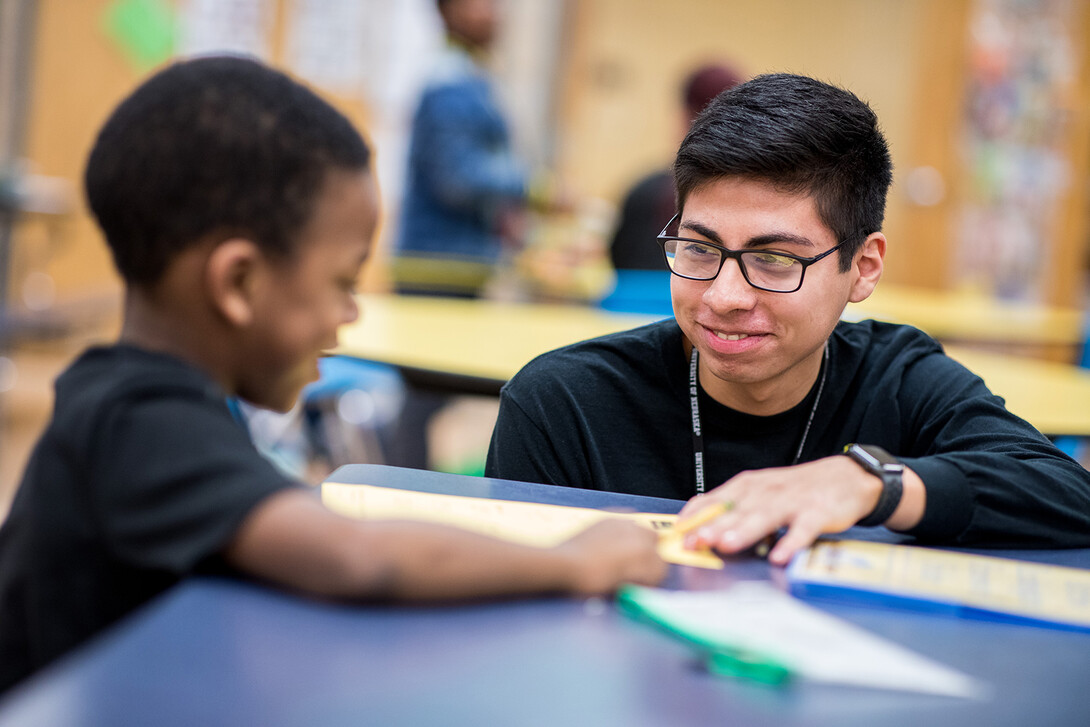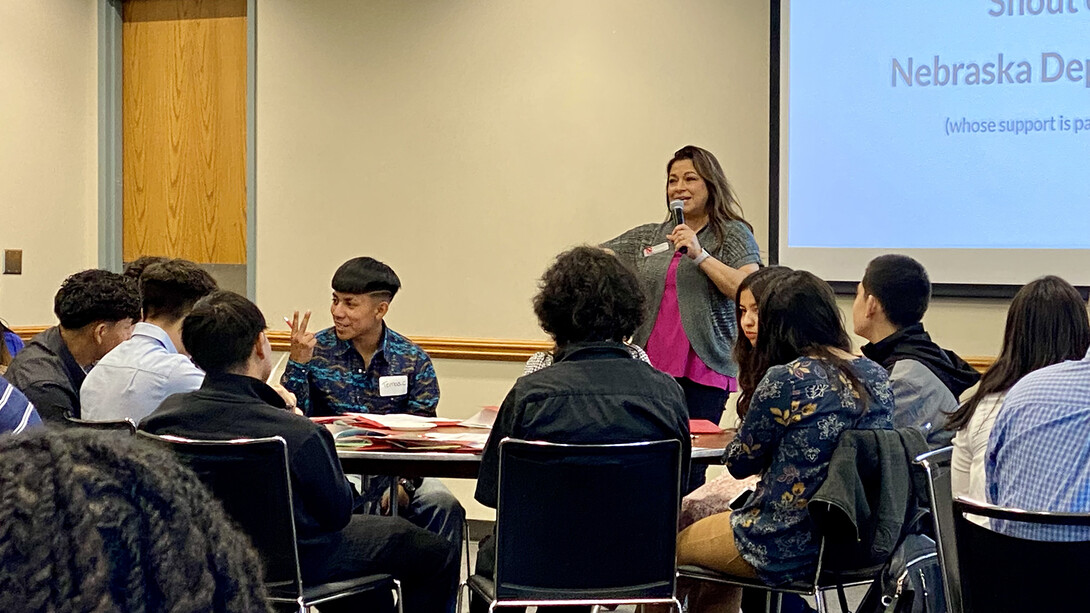
Diversifying and increasing the number of individuals becoming and remaining teachers in Nebraska and Kansas is the focus of a new three-year project.
The project leverages the strengths of the University of Nebraska–Lincoln’s College of Education and Human Sciences and Kansas State University’s Center for Intercultural and Multilingual Advocacy.
Project RAÍCES — Re-envisioning Action and Innovation through Community Collaborations for Equity across Systems — will provide 16 full scholarships to students coming to Nebraska’s teacher preparation programs from Youth Participatory Action Research programs at Lincoln High School, Columbus High School, Schuyler Central High School, South Sioux City High School and Wakefield High School.
“One key goal of this comprehensive project is to more intentionally invest in, nurture and mentor students from a broad range of backgrounds in teacher education here at UNL,” said Amanda Morales, associate professor. “If we do a high-quality job of supporting, engaging and learning from our scholarship students in the process, we will be better equipped to retain and graduate them as powerful new teachers for Nebraska schools. This learning will benefit our entire college as we become an even more effective teacher preparation program for students like them in the future. With tailored mentorship and leadership development afforded them by this project, the sky is the limit and I think they’ll stay in teaching.”
Morales is a principal investigator on Project RAÍCES, along with co-PIs professor Ted Hamann and associate professor Lauren Gatti, both at Nebraska. Socorro Herrera, professor and executive director of Kansas State’s Center for Intercultural and Multilingual Advocacy, is the lead PI on the project and Melissa Holmes is the project director.
The project name, RAÍCES, is derived from a Spanish word that means ‘roots’ as a metaphor to reference both the idea that participants’ cultural backgrounds and ways of knowing their roots are part of what they can rely on to be successful educators in a number of Nebraska’s most diverse districts.
“We also use the metaphor to point out that we’re trying to favorably impact the professional ecology of these partner school districts so that new teachers can arrive, thrive and take root starting careers that will keep them as successful, beloved and inspiring teachers in these communities for much or all of their careers,” Hamann said.
The 16 students recruited to Nebraska’s undergraduate teacher preparation programs through Project RAÍCES will participate in a summer bridge program prior to their first fall semester by taking a credit-bearing summer class. Beginning next fall, the Project RAÍCES cohort will engage in a learning community and receive comprehensive advising and mentoring support throughout their time at the university.
A speaker addresses students during the 2023 YPAR Summit. The YPAR programs were established as part of consecutive pilot projects with the Nebraska Department of Education, with the current $250,000 NDE initiative, “From Diversity Strength,” intentionally intertwining with Project RAÍCES.
“The NDE-funded efforts have allowed us to connect with students and teachers at the project sites for the last two years and to build relationships and operating procedures, such as hosting an annual YPAR Summit at UNL,” Hamann said.
Faculty from TLTE work with liaisons at each of the partner schools to engage students in the YPAR programs. The faculty, in collaboration with these school-based liaisons, help the YPAR students develop research projects that the students have chosen, all of which focus on strengthening some aspect of their school that they have identified. The YPAR leaders then support students in formulating processes and gathering and analyzing data. All of the students involved in YPAR projects will present their research at a YPAR Summit at UNL on April 29.

“The main idea of YPAR is to honor the intelligence, expertise, ideas and opinions of young people,” said Gatti, who leads the YPAR program at Schuyler along with assistant professor of practice Jillian Harpster. “The adults are there to support young people as they think about their personal identities and their school communities and experiences.
“Young people can be change agents in their communities. Part of this is helping students connect with the stakeholders they see as important for the issue that they’ve investigated.”
The year-long experience ends with a YPAR Summit that brings students participating in YPAR at the five schools together on the University of Nebraska-Lincoln campus to present their research to the group. While on campus, students are also taken on a tour and given a better sense of what life is like as a Husker student.
“The idea is to really get them connected to one another and show them that Nebraska is a place where they belong,” Gatti said.
Project RAÍCES promises to further support the YPAR students in their journey to becoming teachers in the hopes of helping diversify the educator population. But Morales acknowledges that pre-service teachers are not the only ones who benefit from this type of support.
“We can’t just support them at the high school level or during their teacher preparation programs when they graduate with a bachelor’s degree,” Morales said. “Because what if they’re graduating and landing in schools with limited induction support or opportunities for mentoring? We have to be thinking comprehensively. We have to be thinking systemically. We have to be looking at the big picture and considering how we are engaging with and supporting our district partners to build their capacities to hold on to their new teachers in ways that allow them to not only survive but to thrive in their first years of teaching.”
Both Project RAÍCES and the NDE project have support for new teacher induction in the partner school districts, which is also where Kansas State comes in. The Center for Intercultural and Multilingual Advocacy works to promote culturally sustaining educational practices through professional development, research, coursework and international partnerships.
“On this grant, Kansas State will focus on professional development for practicing teachers and how to support multilingual learners in diverse classrooms,” Morales said. “They will offer a variety of professional development opportunities for practicing teachers at our partner sites across the region.”
In turn, Nebraska will support new teachers in the involved districts by enrolling them in graduate coursework and creating mentor networks.
As the faculty from both Nebraska and Kansas State put their strengths into action, Project RAÍCES will not only recruit a more diverse teaching force but also help bolster retention of new teachers across the partner districts.
“Kids deserve to see someone who looks like them at the front of the classroom,” Gatti said. “What this grant allows us to do is have a small part in helping to create a teaching force more representative of the students in our schools and really being there for them throughout the entire process.”
The $5.2 million project is funded with a $3.9 million Department of Education grant and a required local 25% match from Kansas State and the University of Nebraska–Lincoln. Nebraska’s portion of the project is more than $2.1 million of the federal funding, with the Office of Research and Economic Development, the College of Education and Human Sciences and the Department of Teaching, Learning and Teacher Education providing Nebraska’s local matching funds.







